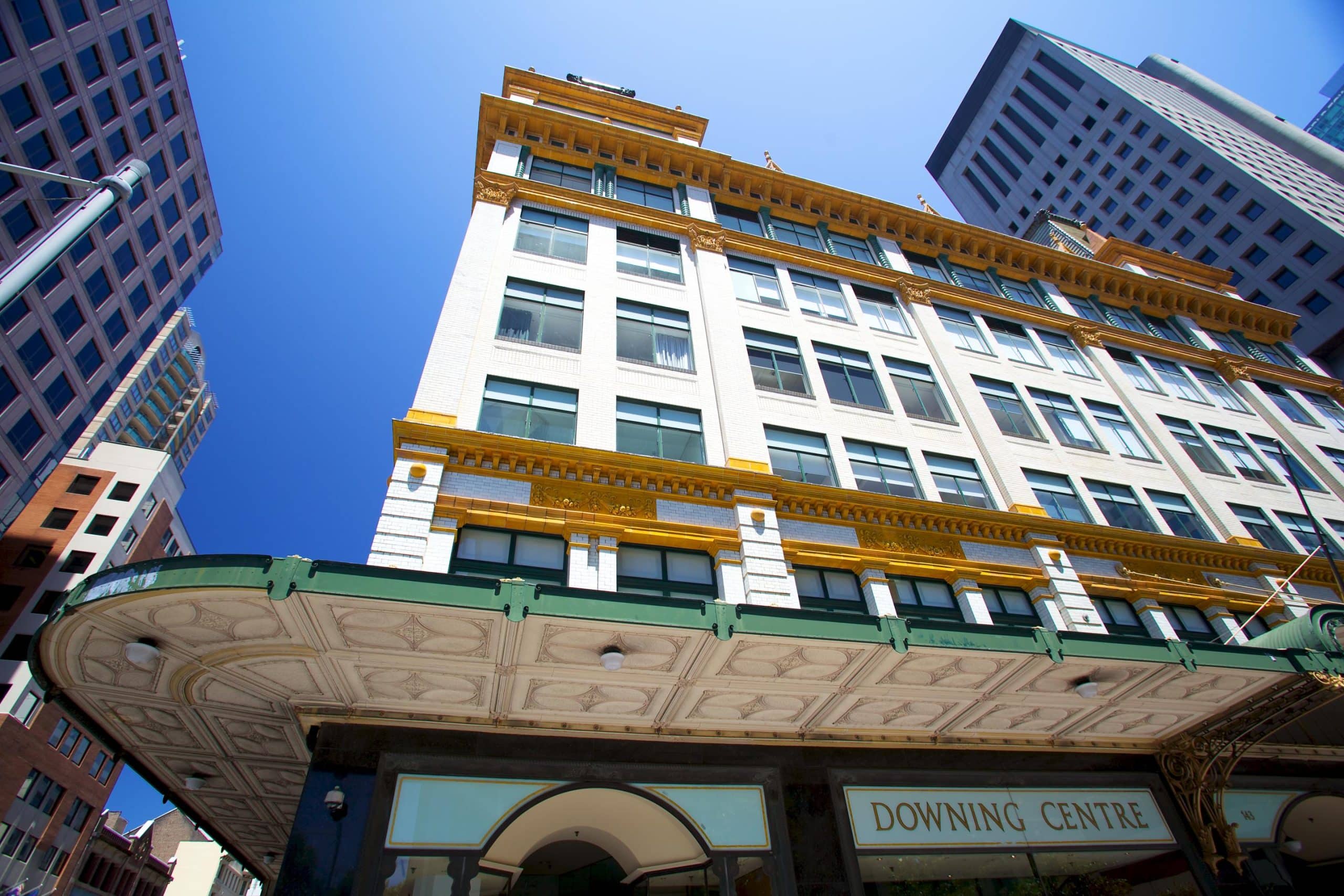Navigating the Downing Centre Local Court can be daunting for those unfamiliar with its processes. At Jameson Law, we understand the importance of being well-prepared when attending court.
This comprehensive guide will walk you through everything you need to know about the Downing Centre Local Court, from its location and operations to what to expect during your visit. We’ll also provide practical tips to help you navigate legal proceedings with confidence.
Where Is the Downing Centre Local Court?
Location and Accessibility
The Downing Centre Local Court stands as a bustling hub of legal activity in Sydney’s heart. You’ll find this courthouse at 143-147 Liverpool Street, Sydney NSW 2000. It’s one of New South Wales’ busiest courts, handling a wide range of cases daily.
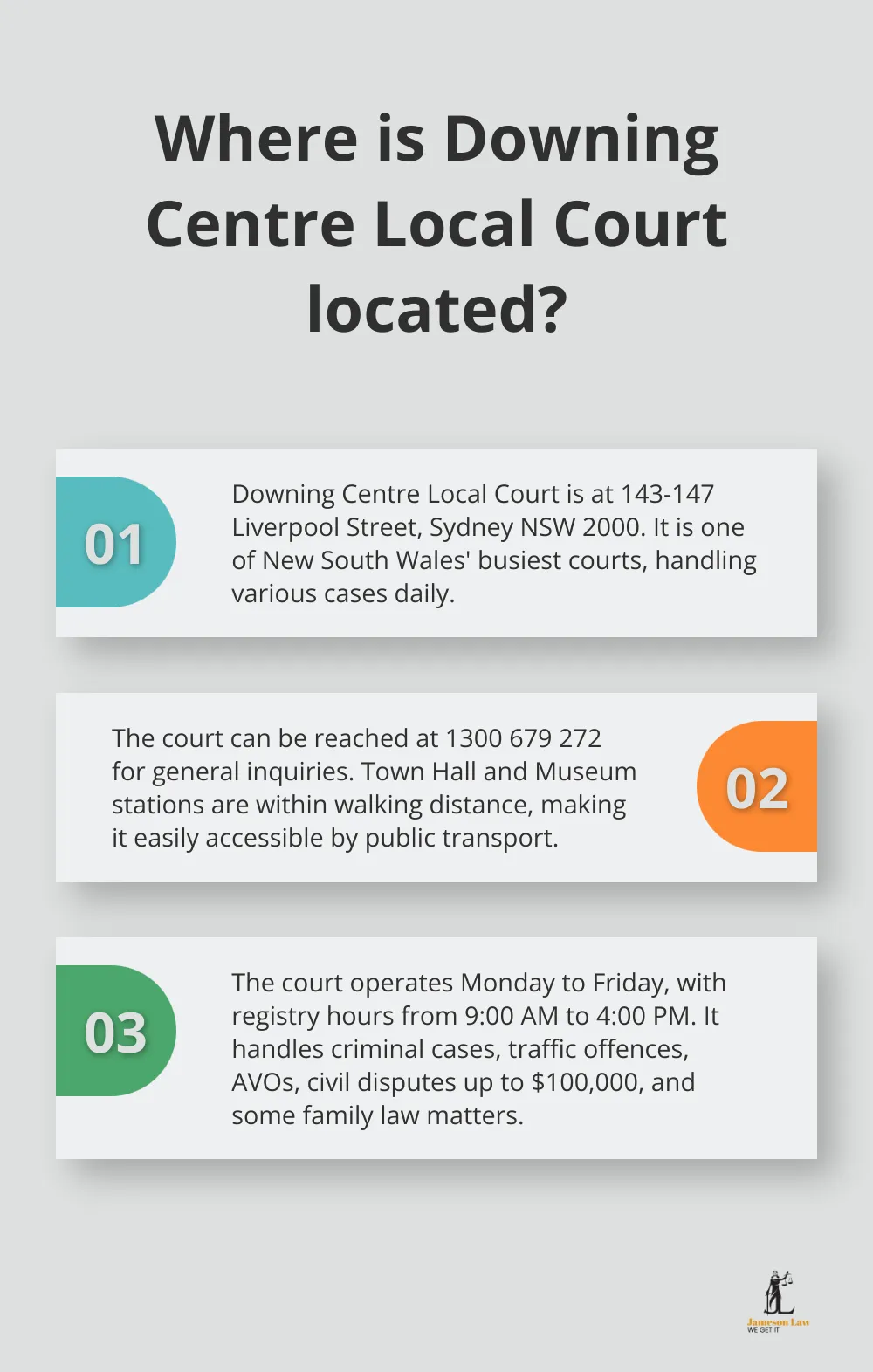
For general inquiries, you can reach the court at 1300 679 272. Public transport makes the courthouse easily accessible, with Town Hall and Museum stations just a short walk away. If you prefer to drive, several parking stations are available nearby (but be prepared for city rates).
Types of Cases Heard
The Downing Centre Local Court addresses various legal matters, including:
- Criminal cases
- Traffic offences
- Apprehended Violence Orders (AVOs)
- Civil disputes up to $100,000
- Some family law matters
This court handles a significant portion of state matters for New South Wales, which underscores its importance in the state’s judicial system.
Court Hours and Operations
The court operates Monday to Friday, with registry hours from 9:00 AM to 4:00 PM. However, specific court times can vary depending on the case nature and the magistrate’s schedule. We recommend you arrive at least 30 minutes before your scheduled time to allow for security checks and to locate your courtroom.
What to Expect on Arrival
When you enter the Downing Centre, you’ll undergo security screening (similar to airport procedures). Once inside, check the electronic boards for your courtroom number. If you’re unsure, the court staff at the information desk can assist you.
Ongoing Improvements
The Downing Centre has been subject to various improvement plans over the years. In the 1930s, there were plans to relocate the court to a “monumental” new structure, which would have involved demolishing most of the existing building.
Attending court can be stressful, but understanding the layout and procedures can help ease your concerns. As you prepare for your visit to the Downing Centre Local Court, you might wonder about the specific protocols and expectations once you’re inside. Let’s explore what you need to know about security procedures, dress code, and available facilities in the next section.
What to Expect When Attending the Downing Centre Local Court
Security Procedures
As you enter the Downing Centre Local Court, you’ll encounter airport-style security screening. Metal detectors and x-ray machines are standard equipment. Some items are not allowed to be taken into court and may be confiscated on the spot. Other items are handed back to you on your way out.
Dress Code and Courtroom Etiquette
The Downing Centre expects formal attire. Don’t wear shorts, singlets, or clothing with offensive slogans. Remove hats in the courtroom. Turn off your phone and avoid bringing food or drinks into the courtroom. Address the magistrate as “Your Honour” and stand when they enter or leave.
Available Facilities and Services
The Downing Centre provides various support services to assist court attendees:
- Legal Aid NSW offers a duty lawyer service for those who can’t afford representation.
- Interpreter services are available for language support. Request an interpreter at least two weeks before your court date to ensure availability.
- The Victims Services unit offers counseling and support for victims of crime.
- Public restrooms and water fountains are available throughout the building.
- A cafeteria operates on the ground floor, providing refreshments and light meals (though food and drinks aren’t allowed in courtrooms).
Navigating the Courthouse
The Downing Centre is a large complex, and finding your way can be challenging. Electronic boards display courtroom assignments and case listings. If you’re unsure about your courtroom or have any questions, approach the information desk on the ground floor. Court staff are there to help you through the process.
Preparation is key to a smooth court experience. Arrive early (at least 30 minutes before your scheduled time), bring all necessary documents, and don’t hesitate to ask for assistance if needed. As you prepare for your court appearance, you might wonder about the specific legal proceedings at the Downing Centre. The next section will guide you through checking your court date, understanding court lists, and exploring legal support options.
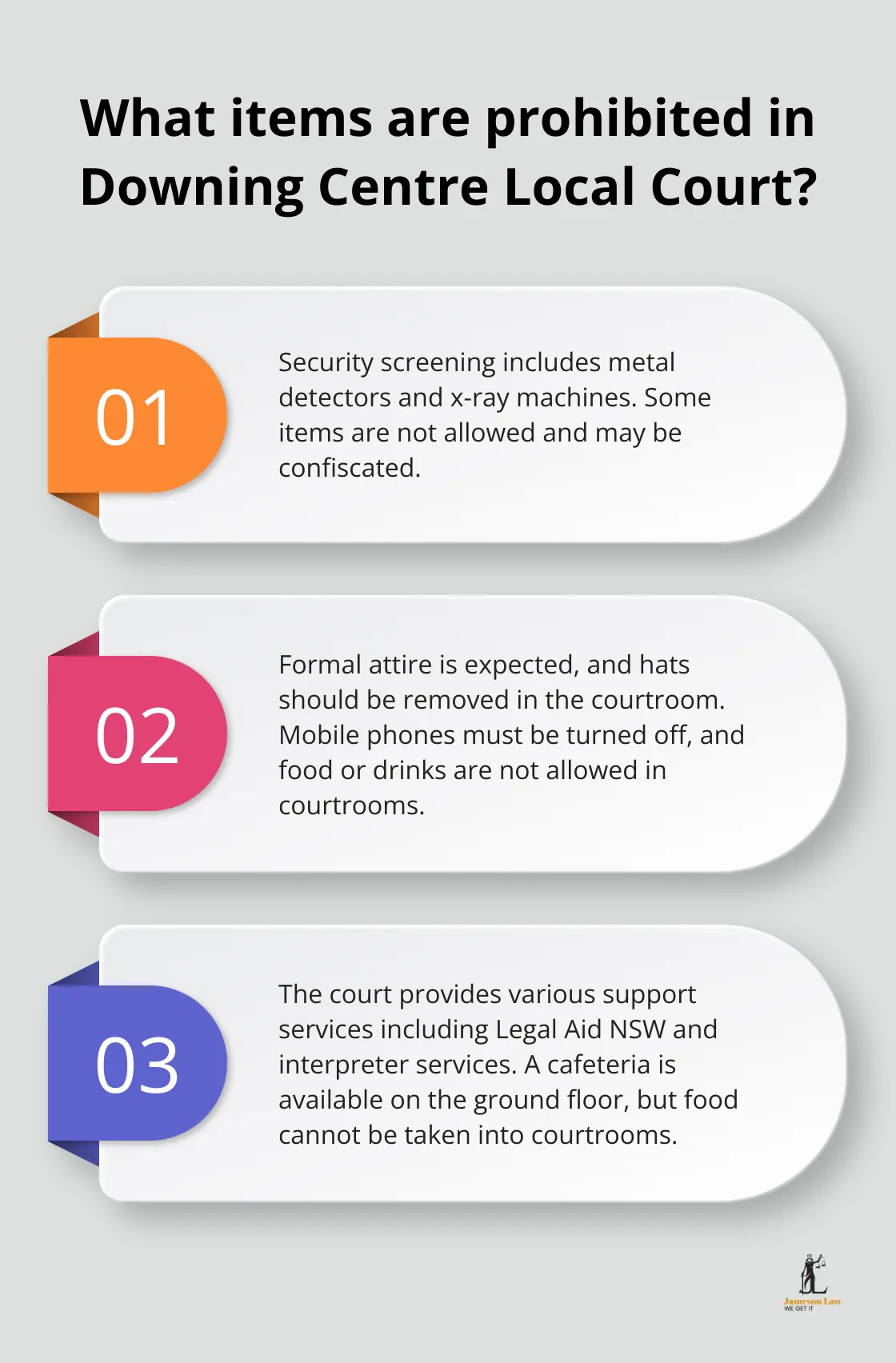
How to Navigate Legal Proceedings at Downing Centre Local Court
Checking Your Court Date
To prepare for your court appearance, you must confirm your court date. You can do this through:
- Your Court Attendance Notice
- The court registry (call 1300 679 272)
- NSW Online Registry website
Verify your court date at least a week before, as dates may change. If you can’t attend, contact the court immediately to request an adjournment. Failure to appear without notification can result in serious consequences (such as being found guilty in absentia or having an arrest warrant issued).
Understanding Court Lists
Court lists display which cases will be heard in each courtroom. At the Downing Centre, electronic boards show:
- Names of charged individuals
- Courtroom numbers
- Estimated times for case calls
Arrive early to check the lists and find your courtroom. Cases aren’t always heard in the listed order, so prepare to wait.
Legal Support and Representation Options
Proper legal representation can significantly impact your case outcome. At the Downing Centre, you have several options:
- Private lawyers: Offer the most control over your representation (if you can afford it).
- Legal Aid NSW: Provides free legal advice and potential representation for eligible individuals.
- Duty lawyer service: Available for first-time court appearances without representation (limited and not guaranteed).
- Community legal centres: Offer free legal advice and possible representation in some cases.
- Aboriginal Legal Service: Assists Aboriginal and Torres Strait Islander people with legal matters.
If you’re unsure about your options, speak to court staff or contact LawAccess NSW (1300 888 529) for guidance. Legal representation can help you navigate complex court procedures and present your case effectively.
Preparing Your Case
To strengthen your position in court:
- Gather all relevant documents (police reports, witness statements, etc.)
- Write down your version of events
- Collect character references if applicable
- Consider seeking legal advice to understand your rights and options
On the Day of Your Hearing
Try to:
- Arrive at least 30 minutes early
- Bring all necessary documents
- Dress formally and respectfully
- Turn off your mobile phone before entering the courtroom
- Follow courtroom etiquette (stand when the magistrate enters, address them as “Your Honour”)
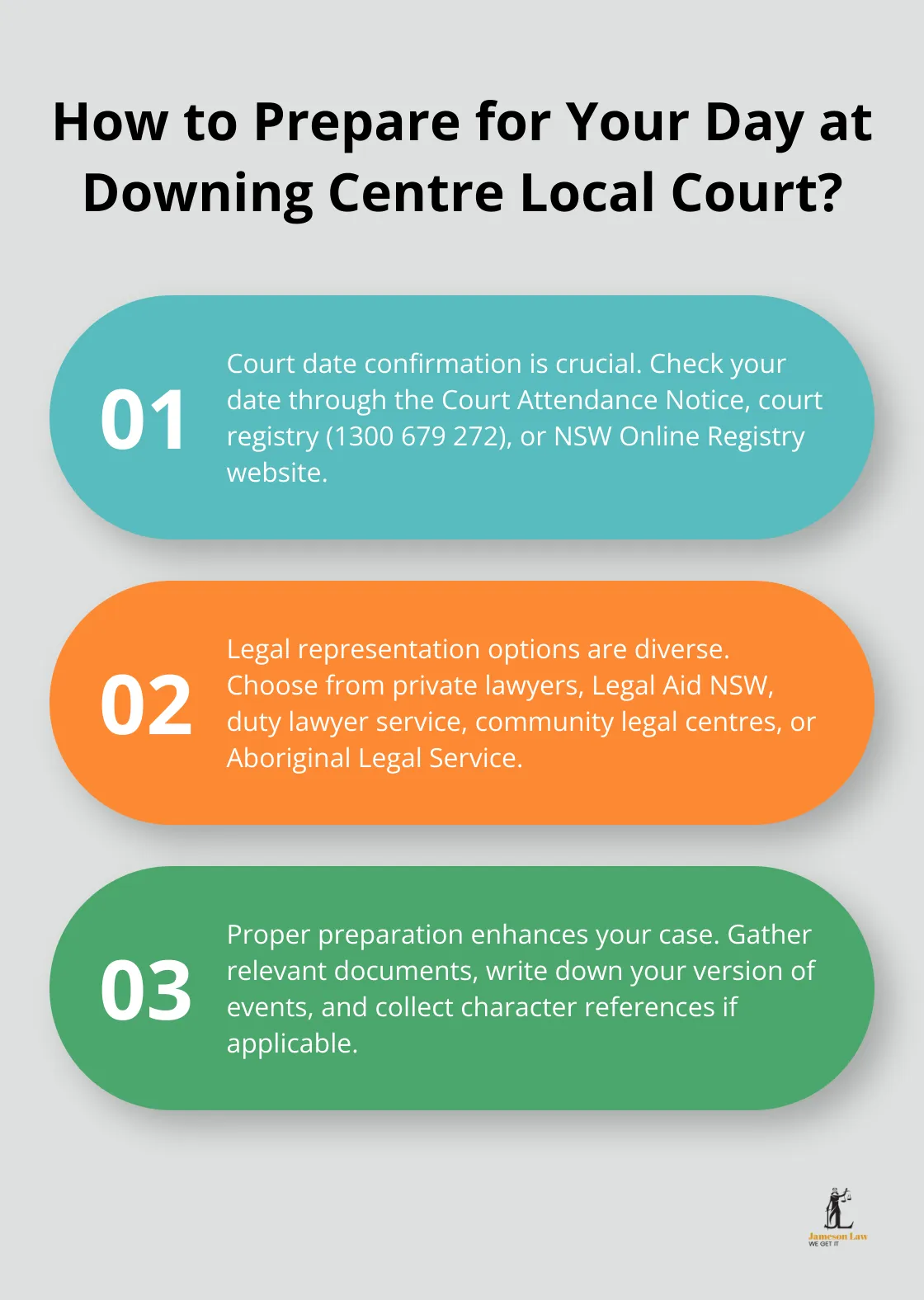
Legal proceedings can be complex, but with proper preparation and understanding of the process, you can approach your court date at the Downing Centre with confidence.
Final Thoughts
The Downing Centre Local Court stands as a vital hub in Sydney’s legal landscape. You must prepare thoroughly for your court appearance by arriving early, dressing appropriately, and bringing all necessary documents. The court offers various support services, including legal aid and interpreters, to assist you through the process.
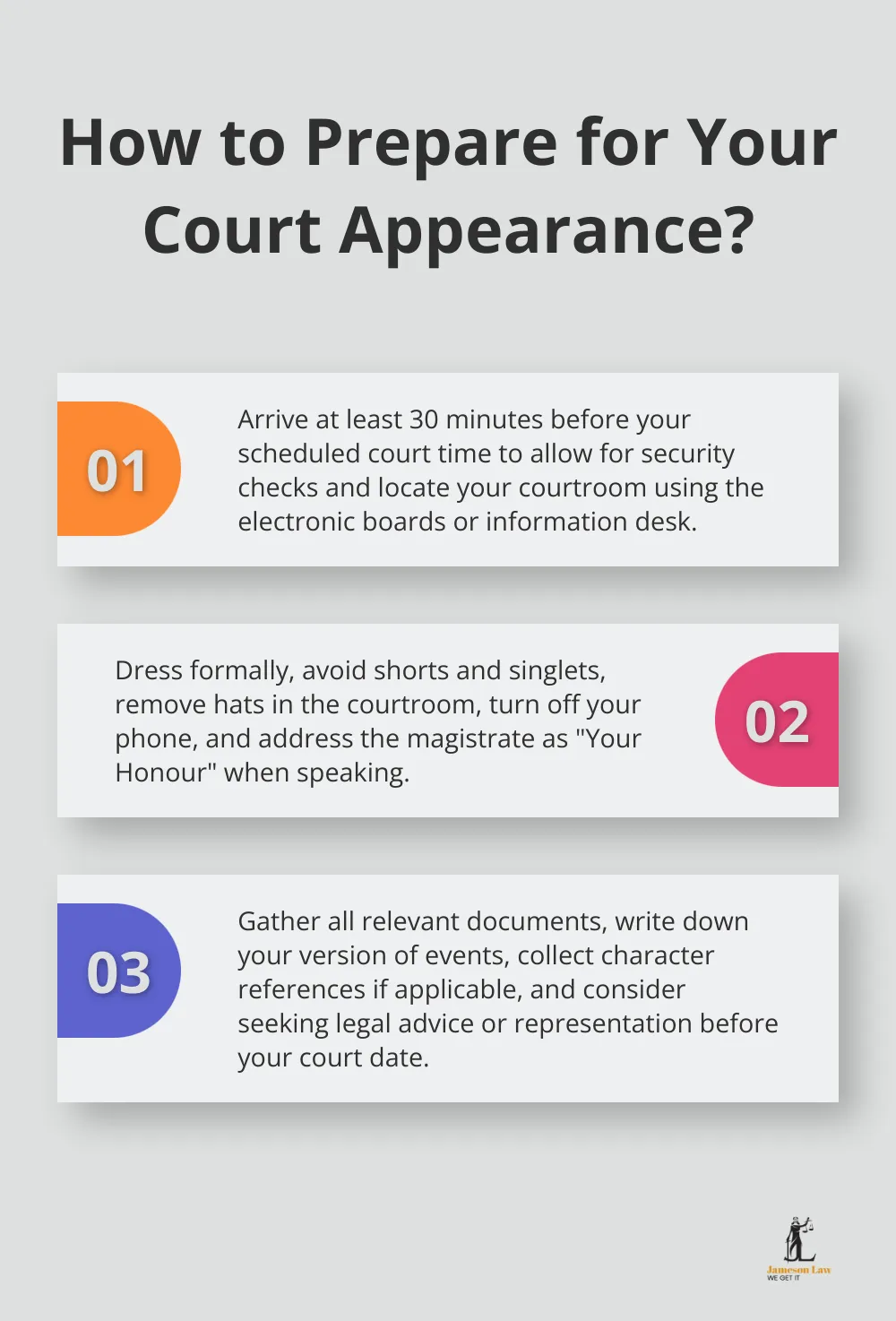
Understanding legal proceedings at the Downing Centre Local Court will help you navigate your case effectively. You should confirm your court date in advance and check the court lists upon arrival. Proper legal representation can significantly impact your case outcome, so consider your options carefully.
Jameson Law provides expert legal services for those facing challenges at the Downing Centre Local Court. We offer tailored support across various practice areas to help you achieve the best possible outcome. The NSW Department of Communities and Justice website also offers additional resources to help you navigate the legal system (should you need them).



